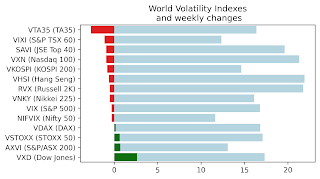Edit Dec 7, 2010: See my updated post on VSXX here.

I've read the description on both indexes and calculation algorithm seems to be the same for both. However the most interesting nugget of information is found in the summary on Deutsche Börse website here, page 5 figure 2. The chart compares performance of two volatility indexes - VIX and VSTOXX vs. their short-term futures indexes. The cost of carry, that eroded VIX futures index to about a third of its starting value in 4.5 years had almost no effect on VSTOXX - based index. Below I reproduce the charts from my data. SPVIXSTR is S&P 500 VIX Short-Term Futures Index, and VST1MT is Euro STOXX 50 Volatility Short-Term Futures Index.


I was going to type up some stats based on the data above, but picture's worth a thousand words. Over the last year and half VXX declined precipitously, however such decline is probably not in the cards for VSXX. While the term stucture of VIX futures is rather steep, making the roll costly, VSTOXX term structure appears to be relatively flat.
Honestly, I cannot say that I know the reason for that. One possible explanation is that I made a mistake , and there is a critical difference in the calculation of two indexes that escaped my attention. That seems unlikely, as Barclays' publication obviously implies that the indexes are comparable. Another explanation can be that there is a greater institutional demand for VIX futures than there is for VSTOXX futures, however to confirm that I would need to separate the effects of risk premium from statistical effects that also produce upward-sloping futures curve. Accomplishing that would be anything but simple.
Leaving theoretical issues aside it appears that smart traders can take advantage of different futures slopes by rolling into the contracts with the cheapest cost of carry, possibly financing the trade with selling the expensive roll. For example consider an investor who is long a broad portfolio of US stocks and wants to hedge against volatility spike. Holding VXX or rolling VIX futures can be very expensive in the long run; doing the same thing with VSXX / VSTOXX futures may be cheaper, while providing a proxy for VIX in the time of volatility spikes.
Edit Dec 7, 2010: See my updated post on VSXX here.



No comments:
Post a Comment